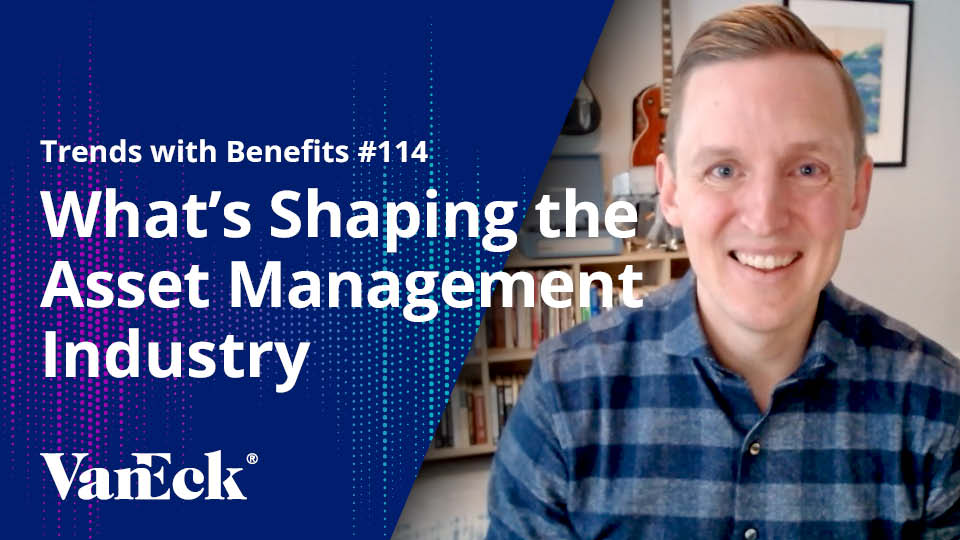Trends with Benefits #1: Want to be a Better Investor? Get to Know Yourself
February 28, 2020
Listen Time 29:53 MIN
Trends with Benefits is a podcast by VanEck with a forward-looking perspective. The podcast explores new ways of thinking about the markets, investing, work and life.
I hosted Ben Carlson on VanEck’s Trends with Benefits podcast to talk about his recently published book, Don’t Fall for It: A Short History of Financial Scams. Ben is the Director of Institutional Wealth Management at Ritholtz Wealth Management, as well as a blogger, author and podcaster. He writes frequently about financial markets and investor psychology in his blog, A Wealth of Common Sense. Ben’s writings are approachable, understandable by non-finance types and full of, well, common sense. So when I learned about the release his new book, I jumped at the chance to interview him. We are at a time where a little self-reflection and review of our own behavioral tendencies as investors are worth exploring.
It’s taken us a little time to release this podcast, so bear with us as we originally recorded this discussion on January 24, 2020 and the perspective from which I wrote this post was prior to the coronavirus infecting people and markets. Nonetheless, whether the stock market is running towards new highs, like it was for most of February, or if we find ourselves with a much deeper drawdown due to the virus’s impact, I hope you find the review of human behavioral tendencies useful and lessons learned timeless.
Fertile Ground for Folly
Consider that, since the depth of the financial crisis, the S&P 500 has returned 498% from March 9, 2009 to December 31, 2019.1 This is equivalent to an annualized return of nearly 18%! Things are good if you have been a stock investor. The level of euphoria, however, does not seem as excessive to me as it did in the months preceding the bursting of the dot-com bubble. Still, you hear echoes of hope and hubris in narratives that, like a siren song, lure investors into rocky waters on the belief that, once again, this time is different.
It’s understandable. A new generation of investors are in the stock market and the market has generally just gone up over the past decade. In addition, technology continues to disrupt industries, making life easier and more hopeful in many ways. In fact, the definition of the word “disrupt” has itself been disrupted into something positive.2
Ben’s book is about financial scams, but I couldn’t help but be reminded of past financial manias and speculative bubbles. I was working at Ibbotson Associates in the early 2000s, and after living through Y2K and the bursting of the tech bubble, I began researching different decades of capital market returns. I reread Burton Malkiel’s A Random Walk Down Wall Street and his description of the “tronics boom” of 1959-1962. Many of the stocks then had some form of “tronics” in their name and some argued that they couldn’t be valued by traditional methods because they represented a new era economy. It sounded eerily similar to what we experienced in 1999, when some form of “.com” adorned the names of the most desired stocks.
My siren song in 1999 came in the form of Qualcomm. It seemed like I could turn on CNBC any given morning during Qualcomm’s stratospheric ascent late in the year and hear on repeat, “Qualcomm, Qualcomm, Qualcomm,” as the hosts bantered on about tech stocks. I bought it in early January 2000. Look that up. What price did you buy bitcoin in 2017? In 2020, maybe your temptation was Tesla after their earnings announcement in January?
It's not that these examples are bad investments. In fact, for some folks, they’ve been great investments. Heck, bitcoin may still end up saving the world economy. This is about remembering that we’ve been here before. Times and situations have changed, but the one constant is human behavior. You can learn to control yours.
Don’t Fall for It
In Don’t Fall for It, Ben includes fantastic stories about how some creative, yet unethical people took advantage of others—stories that reach back generations. Ben shared one of his favorite stories with me about how Al Capone fell victim to a swindler, but still let him live! These stories force you to ask why intelligent people continue to fall prey to fraudsters generation after generation and to consider how you’ll react to new opportunities.
An acutely relevant chapter in the book for today is Chapter 7, “When Fraud Fourishes.” A few of the noted conditions for fraud described are “when markets are rocking,” “when human beings are involved” and “when innovation runs rampant.” Times like these are ripe for the unsuspecting to be swindled, not only by another, but also by their own actions.
Fittingly, with the advent of mobile phones, texting and abbreviated slang, FOMO is the modern way of expressing a very old human condition, fear-of-missing-out. Ben and I discussed one method of how to temper that with JOMO, the joy-of-missing-out.
In addition to our discussion about his book, we also touched on the “Aging Crisis.” A major demographic shift is underway that will challenge retirees, their children and the financial industry. Embedded in this topic is the need for financial education and quality advice. These themes will weave its way into future podcast discussions not only because baby boomers are retiring, but also because financial illiteracy affects people across all ages and social classes.
I know it may seem counterintuitive to look at history in a podcast intended to offer forward-looking ideas, but I found the discussion with Ben to be a perfect way to kick off a show about trends. While being ahead of the curve is great, it’s helpful to remember that if there is one thing that's likely to get in the way of successful investing, it’s you, stupid. JK, LOL!
Trend or Fad?
Listen for Ben’s take on blue vests (the Midtown Uniform), ESG and fake meat.
You can listen and subscribe to our podcast on:
iTunes Spotify YouTube.
A special thanks to Ben Carlson and the folks at Ritholtz Wealth Management for inviting us into their office to record this podcast.
Related Insights
April 16, 2024
March 19, 2024
March 05, 2024
1 S&P 500 Total Return index. Source: FactSet.
2 On the Disruption of 'Disrupt', merriam-webster.com
Important Disclosures
Please note that Van Eck Securities Corporation (an affiliated broker-dealer of Van Eck Associates Corporation) may offer investments products that invest in the asset class(es) discussed in this podcast.
The views and opinions expressed are those of the speaker(s) but not necessarily those of VanEck. Commentaries are general in nature and should not be construed as investment advice. Certain statements contained herein may constitute projections, forecasts and other forward looking statements, which do not reflect actual results, are valid as of the date of this communication and subject to change without notice. Information provided by third party sources are believed to be reliable and have not been independently verified for accuracy or completeness and cannot be guaranteed. Any discussion of specific securities/financial instruments mentioned in the commentary is neither an offer to sell nor a solicitation to buy these securities. Fund holdings will vary. All indices mentioned are measures of common market sectors and performance. It is not possible to invest directly in an index. Information on holdings, performance and indices can be found at vaneck.com.
All investing is subject to risk, including the possible loss of the money you invest. As with any investment strategy, there is no guarantee that investment objectives will be met and investors may lose money. Diversification does not ensure a profit or protect against a loss in a declining market. Past performance is no guarantee of future performance.
Van Eck Associates Corporation
1 S&P 500 Total Return index. Source: FactSet.
2 On the Disruption of 'Disrupt', merriam-webster.com
Important Disclosures
Please note that Van Eck Securities Corporation (an affiliated broker-dealer of Van Eck Associates Corporation) may offer investments products that invest in the asset class(es) discussed in this podcast.
The views and opinions expressed are those of the speaker(s) but not necessarily those of VanEck. Commentaries are general in nature and should not be construed as investment advice. Certain statements contained herein may constitute projections, forecasts and other forward looking statements, which do not reflect actual results, are valid as of the date of this communication and subject to change without notice. Information provided by third party sources are believed to be reliable and have not been independently verified for accuracy or completeness and cannot be guaranteed. Any discussion of specific securities/financial instruments mentioned in the commentary is neither an offer to sell nor a solicitation to buy these securities. Fund holdings will vary. All indices mentioned are measures of common market sectors and performance. It is not possible to invest directly in an index. Information on holdings, performance and indices can be found at vaneck.com.
All investing is subject to risk, including the possible loss of the money you invest. As with any investment strategy, there is no guarantee that investment objectives will be met and investors may lose money. Diversification does not ensure a profit or protect against a loss in a declining market. Past performance is no guarantee of future performance.
Van Eck Associates Corporation




